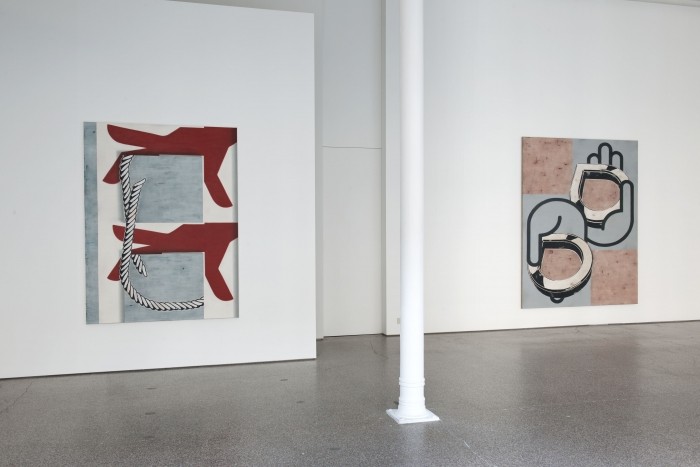Anne Neukamp
21 Nov 2014 - 31 Jan 2015
ANNE NEUKAMP
21 November - 31 January 2015
The recurrent ideas and images in Anne Neukamp's work derive from our everyday environment, they pervade public spaces, they sometimes invade our private sphere. Advertising, road signs, cartoons, logos, pictographs in seductive pink or intense green, against a background of 'non-colours' in brown and grey shades, attract our attention.
The 'found' motifs remind us of the visual language of Pop Art, while they function in a different way. In Neukamp's work they evoke only a feeling of recognisability, they cannot be defined and located, and therefore their efficiency is reduced. They lose their associative and visual logic.
This transformation is the result of a systematic painting, overpainting and painting away, so that the figurative, the ornamental and the abstract relate in a non-hierarchical way in the composition.
Her procedure is varied in technique, material and colour palette. The complex facture of her paintings demonstrates the extent to which she masters the different paints - tempura, oil and acrylic - and painting techniques. From a crude to a very detailed representation, from a rough brush stroke to a brush paint effect, the artist shows the 'painting' touch in its many facets.
Rather than a trivial decision, the way in which paint is applied is dictated by our expectations, our reading of a painting, determined by conventions and traditions. For example, in the 'Trap' painting, the pictorial element, a rope, is represented in a cartoon-like way, and is therefore flattened and less strongly representative, while the monochrome surfaces create the illusion of a third dimension. A contemporary trompe-l'oeil. Those who cling too strongly to expectations must learn that perception may deceive.
21 November - 31 January 2015
The recurrent ideas and images in Anne Neukamp's work derive from our everyday environment, they pervade public spaces, they sometimes invade our private sphere. Advertising, road signs, cartoons, logos, pictographs in seductive pink or intense green, against a background of 'non-colours' in brown and grey shades, attract our attention.
The 'found' motifs remind us of the visual language of Pop Art, while they function in a different way. In Neukamp's work they evoke only a feeling of recognisability, they cannot be defined and located, and therefore their efficiency is reduced. They lose their associative and visual logic.
This transformation is the result of a systematic painting, overpainting and painting away, so that the figurative, the ornamental and the abstract relate in a non-hierarchical way in the composition.
Her procedure is varied in technique, material and colour palette. The complex facture of her paintings demonstrates the extent to which she masters the different paints - tempura, oil and acrylic - and painting techniques. From a crude to a very detailed representation, from a rough brush stroke to a brush paint effect, the artist shows the 'painting' touch in its many facets.
Rather than a trivial decision, the way in which paint is applied is dictated by our expectations, our reading of a painting, determined by conventions and traditions. For example, in the 'Trap' painting, the pictorial element, a rope, is represented in a cartoon-like way, and is therefore flattened and less strongly representative, while the monochrome surfaces create the illusion of a third dimension. A contemporary trompe-l'oeil. Those who cling too strongly to expectations must learn that perception may deceive.

